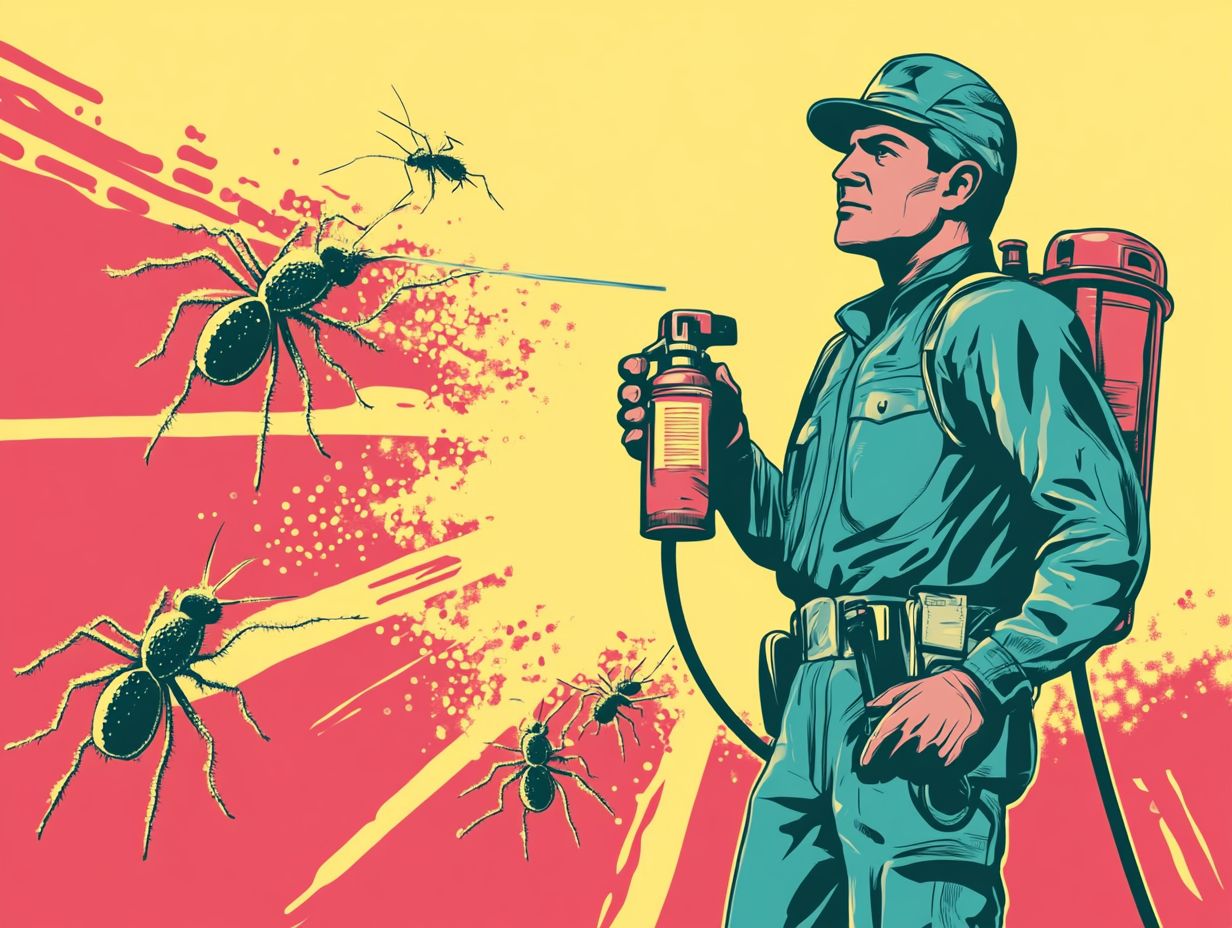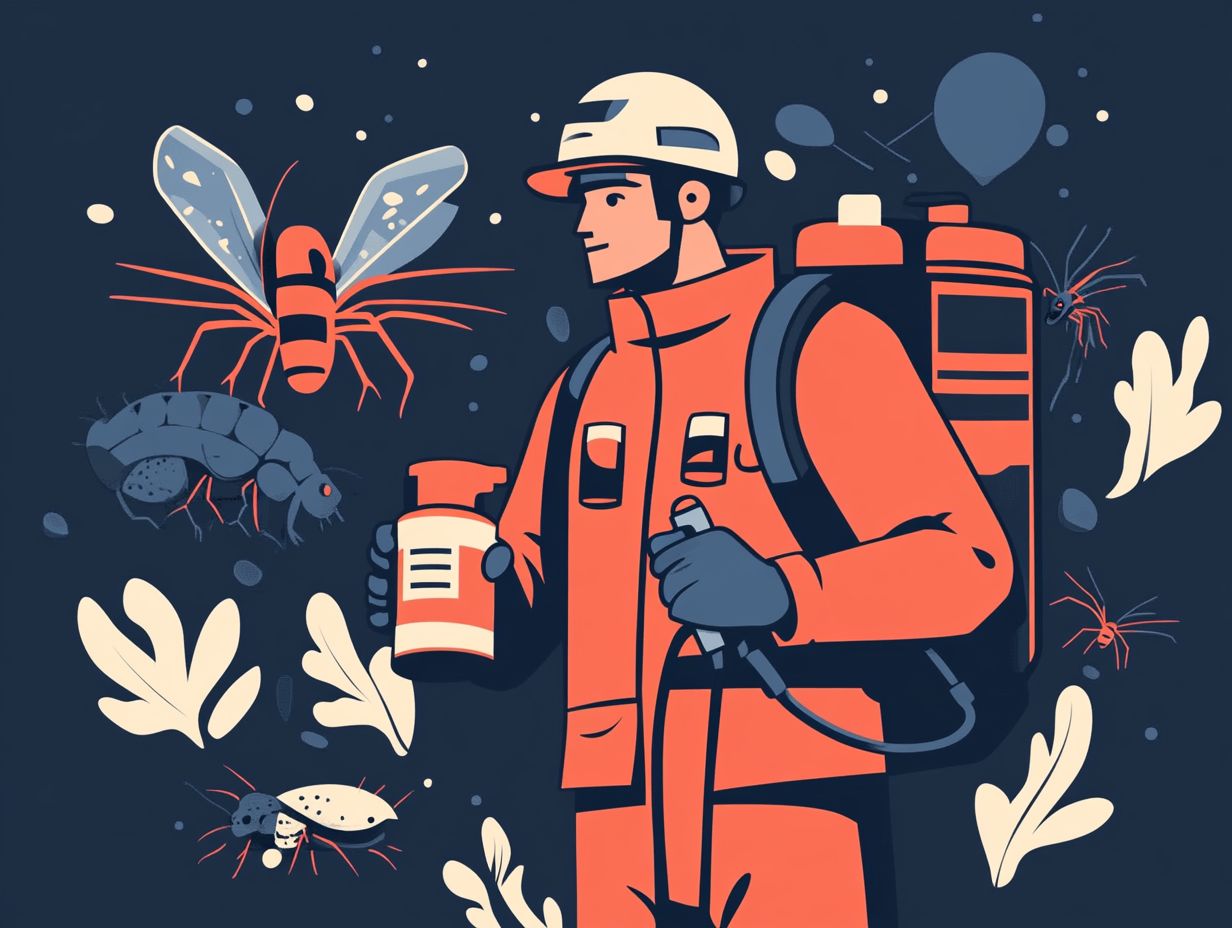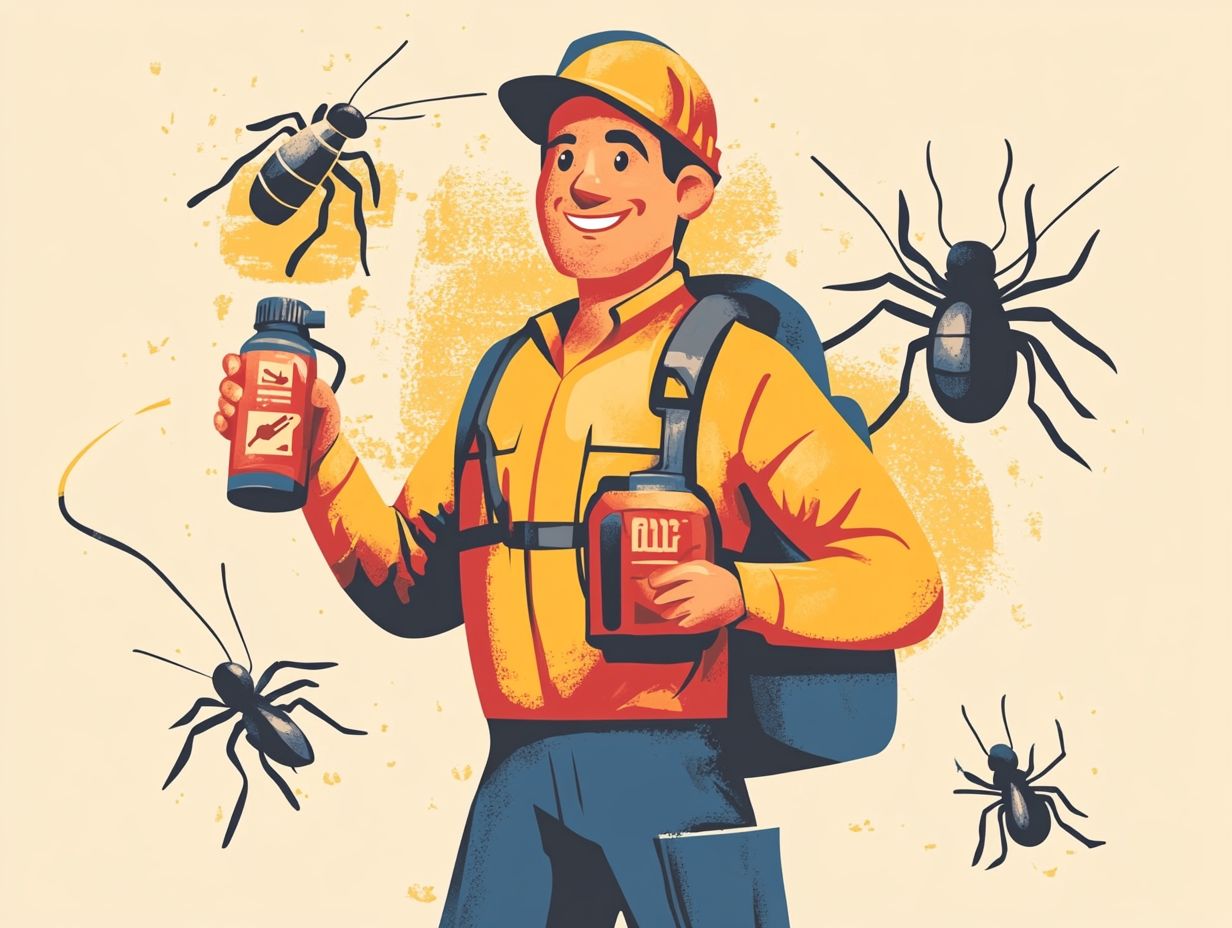Pest control is super important for keeping your living environment healthy and safe. With all sorts of pests out there—from insects and rodents to birds and wildlife—knowing how to handle these unwanted guests is key.
This article dives into the common pests you should keep an eye on, the different pest control methods available, and some handy tips for choosing the right pest control company for your needs. It also highlights the benefits of hiring professional services, helping you make informed decisions to protect your home and health.
Why is Pest Control Important?

Pest control is really important for keeping your environment healthy, whether at home or in your business. It helps prevent those pesky critters from taking over, saving you from property damage and health risks.
Good pest management strategies protect not just your home but also your family, pets, and employees from diseases that pests can spread. By putting some effort into proper pest treatment and prevention methods, you're making sure your space stays safe and comfortable, while also lowering the chances of infestations that could lead to expensive damages and disruptions.
What are the Common Pests that Need to be Controlled?
Understanding the common pests you need to keep in check is crucial for effective pest management, whether you're dealing with your home or a business. Those pesky household invaders—like ants, cockroaches, and termites—can really cause chaos in your space. And don't forget about commercial pests, such as rodents and flies, which can put your hygiene standards at risk.
The first step in tackling these nuisances is proper pest identification, so you can choose the right insect and rodent control methods to combat them and prevent future infestations.
1. Insects
Insects, from ants and cockroaches to termites and bed bugs, are some of those pesky pests that need your immediate attention because they reproduce faster than you can say "infestation." Effective insect control means using targeted strategies for removal and treatment, like traps, baits, and insecticides, to kick those infestations to the curb.
Termites, in particular, are the real troublemakers. If you let them hang around, they can compromise the structural integrity of your home. And don’t get me started on bed bugs—they're infamous for being tough little critters that can turn your nights into a sleepless nightmare with their bites.
When tackling pest problems, it’s crucial to use both preventative measures and reactive techniques. You might want to try natural remedies like diatomaceous earth or essential oils, while also looking into chemical solutions if you’re facing a serious invasion.
Implementing Integrated Pest Management (IPM) can also be a smart move. It combines knowledge of ecosystems with various control methods for results that last, ensuring your home stays pest-free for the long haul.
2. Rodents
Rodents, like mice and rats, are infamous for crashing the party in homes and businesses, making rodent control a top priority for anyone dealing with pests. These little troublemakers don’t just chew through walls; they can also pose serious health risks with their droppings and urine. To keep them at bay, you’ll want to implement some solid pest prevention strategies, like sealing up entry points and keeping things tidy.
The potential for damage really ramps up when these pests decide to nest in your walls or those sneaky hidden corners, leading to even bigger issues. To tackle the problem, using traps—such as snap traps or glue boards—can help you catch them effectively. Don't forget about baiting techniques, too; using tasty food sources can really boost your success.
Regular inspections and addressing any potential food sources, like pet food that’s not stored properly, are essential parts of your pest prevention game plan. Staying alert and using integrated pest management approaches will help you create a rodent-free environment.
3. Birds
While birds can really add to your garden's charm, some species might just decide to crash the party and turn into pesky invaders. They can damage your crops and create hygiene headaches with their droppings, which is why it’s crucial to have the right bird control measures in place, tailored to specific species and situations.
Take starlings and pigeons, for example. They're infamous for nesting in residential and commercial areas, which often leads to a messy accumulation of waste that can attract other pests and even spread diseases. And let's not forget about those flocks of crows that can wipe out a cornfield overnight, leaving you facing some serious financial losses.
To tackle these challenges, there are several bird pest control solutions you can consider:
- Installing physical barriers like netting
- Using sound deterrents
- Deploying bird spikes to stop them from roosting
If things get out of hand, professional pest control services can provide tailored strategies to manage these invasive species effectively, ensuring your property stays both beautiful and hygienic.
4. Wildlife
Wildlife pests like raccoons, squirrels, and skunks can throw a real wrench in the works for homeowners and businesses, making wildlife control a must-have in your pest management toolkit. These critters can wreak havoc on your property, mess up your garden, and even pose health risks, which means you need to jump into action with emergency pest control as soon as you spot them on your property.
Their presence can lead to all sorts of headaches, like ruined insulation, damaged electrical wiring, and those annoying noises that can disrupt your daily life or business operations. And let’s not forget that some wildlife can carry diseases that are no joke, such as leptospirosis from rodents or rabies from raccoons.
To keep these risks at bay, you’ll want to implement effective wildlife control methods, like securing your trash cans, putting up safe barriers, and using humane traps.
If you find yourself facing a severe infestation, don't hesitate to call in professional emergency pest control services. They can help ensure those unwelcome guests are removed safely and efficiently, highlighting how crucial it is to keep an eye on things and take preventative measures to protect your home or business.
What are the Different Methods of Pest Control?
You have several effective pest control methods at your disposal to tackle infestations, and each one is tailored to specific types of pests and environmental factors.
Your options might include:
- Chemical treatments
- Biological solutions
- Mechanical traps
- Cultural practices
These options give you a well-rounded approach to pest management. By understanding these methods, you can choose the pest treatment that fits your situation best.
1. Chemical Control

Chemical control is a popular go-to for pest management, using various products like insecticides and rodenticides to effectively tackle those pesky pest populations. While it gets the job done, you really need to follow safety protocols and guidelines during application to keep yourself, your pets, and the environment safe while dealing with pests.
In terms of insecticides, they’re designed to target specific pests like ants, roaches, and aphids, usually coming in handy forms like sprays or baits that make it easy for you to use. Rodenticides, on the flip side, are all about controlling rodents and can be found in block, pellet, or liquid forms.
It’s super important for you to read those labels carefully and stick to the recommended dosages. Improper use can lead to harmful side effects not just for the pests you’re trying to eliminate but also for other critters that weren’t on the guest list. Considering biodegradable options and those marked as low-toxicity can really help minimize your impact on the environment, creating a balanced approach to pest management that protects both your health and the planet.
2. Biological Control
Biological control is all about using natural predators or pathogens to keep those pesky pests in check, making it a key player in integrated pest management and eco-friendly pest control strategies. This approach not only helps you cut back on chemical use but also supports a balanced ecosystem by bringing in beneficial organisms that tackle pest problems sustainably.
By introducing organisms like ladybugs, predatory wasps, and nematodes, you can effectively target specific pests while still protecting the non-target species. These little helpers work to keep pest populations under control, which means less crop loss and a reduced need for chemical pesticides that can harm both the environment and human health.
Plus, biological control boosts soil fertility and encourages biodiversity, making your agricultural system more resilient. Unlike traditional chemical methods that can lead to pests developing resistance over time, biological control promotes a natural balance in pest management. This way, you can achieve long-term pest suppression while keeping the ecological integrity intact.
3. Mechanical Control
Mechanical control is all about using physical methods to get rid of pests or keep them away, like traps, barriers, and exclusion techniques. This hands-on approach is often your first line of defense and can be a great way to tackle pest problems without turning to chemical treatments.
These methods are pretty straightforward; for instance, you might use sticky traps to catch insects or set up physical barriers to stop animals from sneaking into certain areas. While mechanical control is kind to the environment and cuts down on the need for pesticides, its effectiveness can really depend on the type of pest you're dealing with and how bad the infestation is.
There are some limitations, like the time and effort it takes to set up and maintain these systems. But despite these challenges, many people find that adding mechanical methods to their pest management plan is a smart and sustainable way to stay ahead of the game.
4. Cultural Control
Cultural control is all about tweaking your practices to keep pests from settling in and multiplying. It’s a key part of effective pest prevention and management. Things like crop rotation, sanitation, and habitat modification can really help reduce pest populations and boost the overall health of your garden or home.
By putting these practices into action, you can make your space less inviting for pests. For example, crop rotation messes with the life cycles of pests by switching up the types of plants you grow, which can leave them searching for their favorite snacks. Keeping things clean with good sanitation practices helps prevent organic matter from piling up, which tends to attract pests.
You can also modify the habitat by adjusting lighting or bringing in beneficial plants that repel those critters, giving your defenses an extra boost against unwanted visitors. Together, these cultural control methods not only tackle pests but also help create a more sustainable and thriving ecosystem.
5. Physical Control
Physical control methods are all about using barriers, traps, and other mechanical tools to tackle pests head-on. It’s a straightforward way to manage pest issues, whether you're at home or running a business, allowing you to take immediate action against those unwanted invaders.
By setting up physical barriers like screens and nets, you can keep pests from sneaking into specific areas. Plus, traps can help you capture or eliminate any pests that have already made their way in. This holistic approach not only helps you control the pest population but also reduces your dependence on chemical treatments, making it a more eco-friendly choice.
You’ll find that various physical control methods, such as sticky traps and mechanical devices, can be customized for different types of pests, ensuring they work effectively for your specific situation. On top of being practical, these methods can also save you money in the long run, providing lasting benefits in keeping your spaces pest-free.
How to Choose the Right Pest Control Company?
Choosing the right pest control company is super important for effective pest management and can really make or break your pest control efforts. You want to find a reputable company that offers a variety of services, has plenty of positive reviews, and provides clear pricing.
This way, you can be sure your needs are met while keeping safety and efficiency in mind.
1. Check for License and Certification
One of the first things you should do when choosing a pest control company is to check their licenses and certifications. This helps ensure that the company meets industry standards and has qualified pest control experts on their team. A licensed company gives off that professional vibe and shows they’re serious about safety in pest management practices.
These licenses and certifications aren’t just red tape; they show the company’s commitment to ongoing education and mastering effective pest control methods. In a world where pests and treatment techniques are constantly changing, having certified professionals on board is key to getting lasting results.
You can relax knowing that a properly licensed pest control service has met strict criteria set by regulatory bodies, which reflects its expertise in the field. Plus, certification often goes hand in hand with eco-friendly practices, so you can feel good about the pest management strategies they use being both effective and safe for the environment and your local community.
2. Consider the Types of Pests Being Treated

When you’re picking a pest control company, think about the types of pests you need to deal with, since different companies might specialize in specific pest control services. Properly identifying the pests is key to making sure the company has the right experience and techniques tailored to your needs.
Understanding the different types of pests and their behaviors can really influence your choice of service. For example, a company that’s great at termite control might not be as effective when it comes to rodent problems. So, knowing what pests you’re up against helps you make a smart decision.
Don’t hesitate to ask the company about their expertise in handling specific pest situations. This not only gives you a sense of their capabilities but also ensures they have the right solutions for your unique problem. Taking this proactive approach can give you peace of mind, knowing that your pest issues are in the hands of knowledgeable professionals.
3. Ask About the Methods and Products Used
You should definitely ask about the pest control methods and products that the company uses. This gives you a clearer picture of how effective and safe their treatment strategies really are. It’s important to choose a company that puts eco-friendly pest control solutions at the forefront and uses integrated pest management techniques whenever possible.
By digging into the specific methods and products they employ, you can see how well a company balances the need to reduce pest populations while also protecting human health and the environment. This information give the power tos you to make informed choices, so you can select services that achieve the results you want while being responsible about it. Companies that emphasize safety often use innovative methods that cut down on chemical use, showcasing their commitment to sustainability.
Making sure that pest control strategies meet both effectiveness and safety standards can really influence the long-term success of pest management.
4. Inquire About Safety Measures
When you're picking a pest control company, safety should be at the top of your list. Make sure to ask about the safety measures they have in place during pest management, including the types of products they use. Your family's safety, along with your pets and the environment, is super important when dealing with pest treatment.
Responsible pest management companies understand the need for environmentally friendly products that are both effective and safe. They should be open about their methods and ready to provide you with detailed information on how they minimize any risks related to chemical exposure.
Look for companies that implement integrated pest management strategies, focusing on preventive measures and using the least toxic control options available. Before you hire a pest control service, don’t hesitate to ask about the training and certifications of their technicians. You want to ensure they know how to handle things safely and follow emergency protocols.
By putting safety first, pest control companies can build trust and confidence with their clients, and that’s a win-win for everyone.
5. Read Reviews and Ask for Recommendations
Reading pest control reviews and customer testimonials is a smart way for you to gauge the quality of a pest control company. Positive feedback from previous clients gives you valuable insight into the company’s reliability, effectiveness, and customer service experience, helping you make a more informed decision.
Exploring different platforms like social media, review websites, and community forums can uncover a wider range of opinions. This variety ensures you're not just relying on one source of information, which might be biased. Recommendations from friends or family add a personal touch to your selection process, boosting your trust in the choice you make.
By considering multiple viewpoints, you can get a clearer picture of what to expect from a pest control provider, leading you to a choice that you’ll be happy with.
What are the Benefits of Professional Pest Control Services?
When you invest in professional pest control services, you're not just getting rid of pests; you're unlocking a bunch of benefits that go beyond that quick fix. These services offer long-term solutions and bring you peace of mind.
With their expertise in pest management and customized pest control plans, you can create a pest-free environment. Plus, you get the added bonus of guarantees and follow-up consultations for ongoing support, so you’re never left in the lurch.
1. More Effective Pest Control
One of the biggest perks of hiring professional pest control services is that they’re way more effective than those DIY methods you might be tempted to try. Their trained technicians come armed with advanced pest management strategies and products, which means they can tailor their solutions specifically to your property’s needs.
Plus, these pros have access to high-grade pesticides and innovative tools that you won't find at your local store. So, when you face a tough challenge, like an infestation that just won’t budge with over-the-counter solutions, the expertise and resources of a pest control service really come in handy.
They’re always updated on the latest industry trends, ensuring they use the most efficient and environmentally friendly methods available. This means that by relying on their services, you’re not just tackling immediate pest problems; you're also setting up long-term prevention strategies that give you some serious peace of mind.
2. Cost Savings
You might think of professional pest control services as just another added expense, but they can actually save you a ton of money in the long run by preventing the extensive damage that infestations can cause. Regular pest management helps you steer clear of those costly repairs and health issues that pop up when pests go unchecked.
When you engage with experts early on, you can reduce the risks that might escalate into serious, pricey problems down the line. For instance, a solid pest control plan keeps your property's structural integrity intact. Pests like termites and rodents can wreak havoc on your foundations and walls, leading to repair bills that could make your wallet weep.
Plus, protecting yourself against potential health risks associated with pests means you’ll face fewer medical expenses and won’t lose wages due to health complications. So, these services aren’t just a precaution; they’re a smart economic investment that really pays off over time. In short, investing in early intervention through professional pest control is a savvy move that helps keep your finances stable.
3. Time Savings

Hiring professional pest control services can save you a ton of time. These technicians know how to spot and tackle pest issues quickly and effectively, which means you can focus on your daily responsibilities instead of getting bogged down in pest management.
With their expertise, they can diagnose the root cause of infestations in no time, implement targeted treatments, and keep an eye on things to prevent those pesky critters from coming back. Their specialized knowledge allows them to use the most effective methods and products, cutting down the time it takes to get rid of pests compared to trying to do it yourself.
Plus, professional pest control services often offer ongoing maintenance plans. This means your home can stay pest-free without you having to constantly intervene, saving you from the headache of recurring pest problems.
In the end, this efficiency not only frees up your valuable time but also gives you peace of mind by restoring a safe and comfortable living environment.
4. Reduced Risk of Health Hazards
Professional pest control services can really help you reduce the health risks that come with pest infestations. Those trained technicians know how to apply targeted pest management techniques that get to the root of the problem. This proactive approach doesn’t just get rid of existing pests; it also helps prevent future health risks related to contamination and disease.
By using a mix of inspection, identification, and strategic treatments tailored to your space's unique needs, these pros are ready to tackle a variety of pests, from pesky rodents to annoying insects. When pests like cockroaches and rodents invade your home, they can bring along allergens, pathogens, and toxins, which can be serious health threats, especially for those with pre-existing conditions or weaker immune systems.
Having regular maintenance and monitoring from pest control experts is key to protecting your home and the well-being of everyone living there.
5. Long-term Prevention
One of the key benefits you'll find when you engage professional pest control services is their focus on long-term prevention strategies. They tackle potential infestations before they even have a chance to begin. By implementing effective pest control solutions that include regular inspections and preventative treatments, you can enjoy a pest-free environment all year round.
This proactive approach not only keeps those unwanted visitors at bay but also saves you the stress and financial headache that often comes with reactive pest control measures. Professional pest control experts have the know-how and tools to spot vulnerabilities in your property. This allows them to create a comprehensive plan tailored to your specific needs.
By prioritizing prevention, they make sure that the actions you take today will set you up for success in the future, creating a sustainable environment where pests are much less likely to return.
Frequently Asked Questions
What is a pest control advertisement?
A pest control advertisement is a promotional material or message that aims to advertise and promote the services of a pest control company.
What are the benefits of using a pest control advertisement?
Using a pest control advertisement can help increase awareness of a company's services, attract new customers, and ultimately lead to more business and revenue.
How can I create an effective pest control advertisement?
To create an effective pest control advertisement, it is important to clearly communicate the services offered, use eye-catching visuals, and highlight the advantages of choosing your company over others.
Are there any regulations or guidelines for pest control advertisements?
Yes, depending on the location, there may be regulations or guidelines set by local authorities for pest control advertisements. It is important to research and adhere to these guidelines to avoid any legal issues.
What should I include in a pest control advertisement?
A pest control advertisement should include the company's name and contact information, a brief description of services offered, any special offers or promotions, and any certifications or licenses the company holds.
Do pest control advertisements actually work?
Yes, pest control advertisements can be an effective way to reach potential customers and generate business. However, it is important to create a well-designed and targeted advertisement to see the best results.

